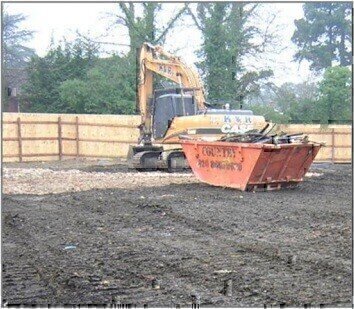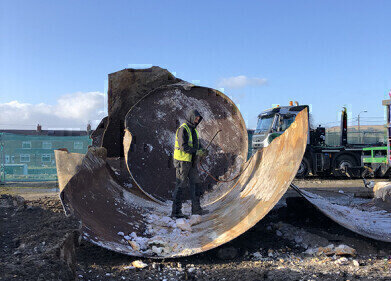Soil Remediation
Rare Decontamination Project
Nov 15 2012
Provectus (UK) recently undertook a new approach to soil clean up from an old printing works with Spirax Sarco providing a steam system to help make this a reality.
The site was found in Somerset and was contaminated with toluene. This flammable substance was looking to be removed to help make the land available for housing. In what is believed to be the first project of its kind, Provectus chose to remove the soil and treat it above ground thanks to an extensive system of steam heating coils. Spirax Sarco were brought in to design the steam distribution system that could cope with the job.
The usual approach when treating toluene is to inject live steam into the ground to vaporise the volatile solvent. The local geology meant this was not a possibility and may even have resulted in the toluene spreading into surrounding areas. The amount of soil being treated also meant that a barrier around the operation would not have been effective either.
The company therefore decided to treat the soil ex-situ, where it could control the process more effectively. “It meant we could homogenise the material better and improve the transmissivity,” says Provectus Director Steve Langford. “It also prevented any contaminated vapour from migrating into the surrounding area through the fractured geology.”
On top of this heating coils were more energy and water efficient than injecting steam into the soil. Spirax Sarco advised using steam as the heating medium in the coils rather than hot water, because it would remain at a constant temperature, rather than cooling down as it passed through the system.
Spirax Sarco engineers devised a series of trombone-shaped coils, laid flat across one of the old concrete factory floors. Several thousand metres of pipework were needed to provide a big enough heating area to treat the batches of soil that were piled on top. It was tricky to calculate the necessary heat transfer area, because the ability of the soil to conduct heat changed as the material nearest the heating coils dried, making it more difficult for the heat to flow through to the remaining soil.
Bristol-based contractor Engineering Services assembled the necessary pipework according to the Spirax Sarco design, complete with steam traps and associated controls to ensure that the system worked smoothly. The company also provided a 1250kW containerised boiler to generate the steam.
“It was quite a complex arrangement, but the biggest challenge for us was the physical site conditions,” says Bob Clark, managing director of Engineering Services. “We were working exposed to the weather for the whole time.
The process ran over the four weeks, heating around 4,000m3 of material and collecting the resulting vapour in plastic sheeting. From there the solvent passed through a system of activated carbon beds, which absorbed the toluene before discharging clean air to the atmosphere.
“We’d never seen a project like this and neither had the Environment Agency personnel who inspected the operation,” says Mr Langford. “We’d cleaned up the first batch of soil within two weeks and the site is now suitable for even the most sensitive developments – residential housing with gardens.”
“I’m more than happy with the support we got from Spirax Sarco, which helped us to complete the project so quickly and efficiently. The solution prevented us from having to send the contaminated soil off to landfill and bring in replacement material.”
“We’ve worked on projects with Spirax Sarco for over 20 years,” adds Mr Clark. “This was the first time anyone had attempted to do a clean-up this way and the results were outstanding.”
Events
WEATHER • CLIMATE • WATER / EARTH OBSERVATIONS / GREEN ECONOMY
Oct 29 2024 St. Petersburg, Russia
Oct 30 2024 Hong Kong
Nov 05 2024 Toronto, Canada
Nov 06 2024 Ho Chi Minh City, Vietnam
Nov 12 2024 Valencia, Spain













